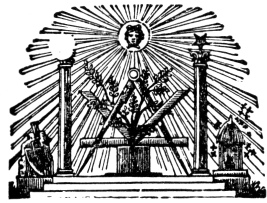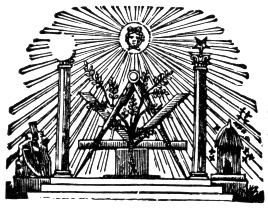p. 74
Contemplating these bodies, we are inspired with a due reverence for the Deity and his works and are induced to encourage the studies of astronomy, geography, navigation, and the arts dependent on them, by which society has been so much benefited.
The composition of these pillars is molten or cast brass; they were cast whole, on the banks of the river Jordan, in the clay grounds between SUCCOTH and ZAREDATHA, where King Solomon ordered these and all holy vessels to be cast.
They were cast hollow, and were four inches or a hand’s breadth thick. They were cast hollow the better to withstand inundation and conflagrations, and are said to have contained the archives of Masonry.
Conductor–Brother, we will pursue our journey. (Stepping to the three steps on the floor or carpet.) The next thing that attracts our attention are the winding stairs which lead to the Middle Chamber of King Solomon’s Temple, consisting of three, five, and seven steps.
The first three allude to the three principal stages of human life, namely, youth, manhood, and old age. In youth, as Entered Apprentices, we ought industriously to occupy our minds in the attainment of useful knowledge; in manhood, as Fellow Crafts, we should apply our knowledge to the discharge of our respective duties to God, our neighbors, and ourselves; so that in old age, as Master Masons, we may enjoy the happy reflections consequent on a well-spent life, and die in the hope of a glorious immortality.
They also allude to the three principal supports in Masonry, namely, Wisdom, Strength. and Beauty; for it is necessary that there should be wisdom to contrive, strength to support, and beauty to adorn all great and important undertakings.
They further allude to the three principal officers of the Lodge, viz.: Master, and Senior and Junior Wardens.
Stepping forward to the five steps, he continues:
The five steps allude to the five orders of architecture and the five human senses.
The five orders of architecture are Tuscan, Doric, Ionic, Corinthian, and Composite. (Reads from Monitor respecting the orders of architecture.)
The five human senses are hearing, seeing, feeling, smelling, and tasting, the first three of which have ever been highly es-teemed among Masons: hearing, to hear the word; seeing, to see the sign; feeling, to feel the grip, whereby one Mason may know another in the dark as well as in the light. (Steps forward to the seven steps.)
The seven steps allude to the seven Sabbatical years, seven
p. 75
years of famine, seven years in building the Temple, seven golden candlesticks, seven wonders of the world, seven wise men of the east, seven planets; but, more especially, the seven liberal arts and sciences, which are grammar, rhetoric, logic, arithmetic, geometry, music, and astronomy. For this and many other reasons the number seven has ever been held in high estimation among Masons. (Reads from Monitor respecting grammar, rhetoric, &., &c.)
By this time the Senior Deacon has passed the entire representation of the flight of stairs, and is now at the Junior Warden’s station in the south. Upon arriving here, he (the Senior Deacon) says to the candidate:
Brother, we are now approaching the outer door of King Solomon’s Temple, which appears to be tyled or guarded by the Junior Warden. (Some say–our Junior Warden.)
As they approach the Junior Warden’s desk, he (the Junior Warden) exclaims:
J. W.–Who comes here?
S. D.–A Craftsman, on his way to the Middle Chamber of King Solomon’s Temple.
J. W.–How do you expect to gain admission?
S. D.–By the pass, and token of the pass of a Fellow Craft.
J. W.–Give me the pass.
S. D.–Shibboleth.
J. W.–What does that denote?
S. D.–Plenty.
T. W.–How is it represented?
S. D.–By ears of corn hanging near a water-ford.1
J. W.–Why originated this word as a pass?
S. D.–In consequence of a quarrel which long existed between Jephthah, judge of Israel, and the Ephraimites: the latter had been a stubborn, rebellious people, whom Jephthah had endeavored to subdue by lenient measures, but to no effect. The Ephraimites, being highly incensed for not being called to fight, and share in the rich spoils of the Ammonitish war, assembled a mighty army, and passed over the river Jordan to give Jephthah battle; but he, being apprised of their approach, called together the men of Gilead, and gave them battle, and put them to flight; and, to make his victory more complete, he ordered guards to be placed on the different passes on the banks of the river Jordan,

Moe is the founder of GnosticWarrior.com. He is a father, husband, author, martial arts black belt, and an expert in Gnosticism, the occult, and esotericism.




